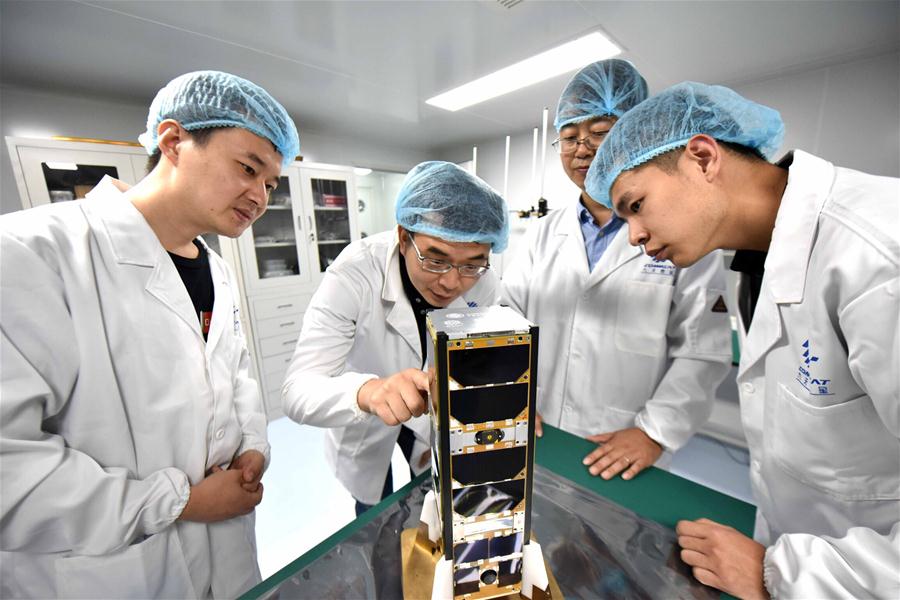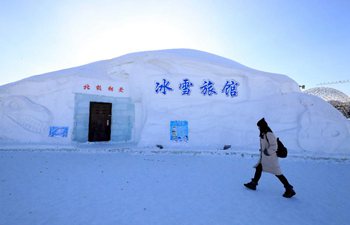
Researchers discuss satellite problems in Beijng, capital of China, Oct. 24, 2017. China's first shared education satellite, Young Pioneer 1, carried by the Long March-2D rocket, was launched into space Friday from Jiuquan Satellite Launch Center. After in-orbit tests, it will share its data resources with primary and secondary schools to provide students with experiences like wireless communication and space photography. (Xinhua/Chinese Academy of Sciences )
JIUQUAN, Feb. 2 (Xinhua) -- China's first shared education satellite, Young Pioneer 1, carried by the Long March-2D rocket, was launched into space from Jiuquan Satellite Launch Center Friday afternoon.
The 3-kg CubeSat (100 * 100 * 340mm), Young Pioneer 1, enters an orbit of 502 km above the Earth. The rocket also carried Zhangheng 1, an electromagnetic satellite to study earthquake data, and five other miniaturized satellites.
Young Pioneer 1 was manufactured and tested by Commsat, a Beijing-based private satellite company funded by the Xi'an Institute of Optics and Precision Mechanics under the Chinese Academy of Sciences (CAS).
It will perform wireless storage and transmission of radio waves at UV frequency, space imaging and the verification of user links to the Internet of Things, said Xie Tao, founder and CEO of Commsat.
After in-orbit tests, Young Pioneer 1 will share its data resources with primary and secondary schools and other education institutions equipped with sub-stations in China. It will provide students with experiences like wireless communication and space photography, Xie said.
"Since our company is based in an industrial park for start-ups, Young Pioneer 1 could also be seen as China's first satellite made in a warehouse," Xie said.
After working for the state-run China Aerospace Science and Technology Corporation for more than a decade, Xie resigned in 2014 and set up his own company in June 2015.
The shift from state-run companies to entrepreneurial warehouse indicates the increasing diversity and opportunities in China's aerospace industry.
Xie believes his company, a pioneer of commercial satellites, is more market-oriented, closer to the public and "down to earth."
"We have equipped Young Pioneer 1 with an intelligent CPU chip that will enable the satellite to restart if problems occur, just like a smart phone. In the future, the chips will be upgraded very quickly, which will help us make more intelligent nanosatellites with more functions," he said.
"To cut costs, commercial satellites also use cheaper components and parts, unlike state space missions, which are usually of strategic importance and must have no mistakes," he added.
The creativity is manifested also in its openness. Young Pioneer 1 involved children in its design.
Since 2016, the design stage of the satellite has seen the participation of tens of thousands of students from over 1,000 schools across China. Functions such as wireless communication and space photography were inspired by ideas and proposals from these young enthusiasts.
In December 2017, the main ground station of Young Pioneer 1 was completed in the China Soong Ching Ling Science and Culture Center For Young People. It will allow young people to gain a thorough view of the satellite's position, orbit and pictures, said Dr. Liu Likun, chief designer of the satellite and CTO of Commsat.
Moreover, a series of sub-stations have been constructed or are under construction in schools in Beijing, and Hainan, Guangdong and Henan provinces.
"We hope to ignite the passion of Chinese children to explore the unknown and guide them to look up into space, with their thoughts extended globally," said Peng Yuanyuan, co-founder and COO of Commsat.
Commsat also plans to launch a constellation of seven satellites in the latter half of 2018, including an entertainment satellite in cooperation with ofo, a Chinese bike-sharing company.
The constellation will help extend the Internet of Things, Xie said. "Commercial aerospace is a burgeoning industry, and we will do our best to catch up with our Western peers," he said.















